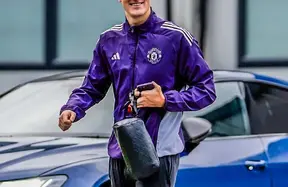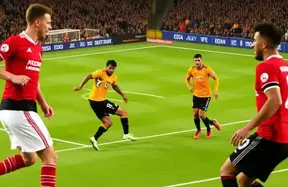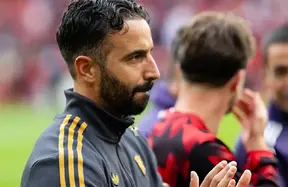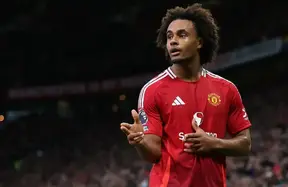A heated debate erupted after a high-profile Premier League game in which Anthony Taylor declined to award a penalty despite contact in the box. While many fans insisted it was a “stonewall” call, on closer inspection the attacker appears to initiate the collision, using a trailing leg to create contact as the defender withdraws. VAR conducted a silent check and did not intervene, indicating no clear and obvious error. Some supporters claimed bias and inconsistency, others accused the forward of looking for it. Notably, pre-match chatter referenced a first-scorer prediction involving Matheus Cunha, adding further noise around the incident.
During a tense Premier League fixture officiated by Anthony Taylor, a second-half flashpoint inside the penalty area ignited controversy. The on-field decision was no penalty; VAR reviewed remotely and maintained the on-field call. The discourse quickly polarized, with segments of the fanbase alleging inconsistency and bias, while others argued the attacker initiated contact. Pre- and post-match discussions also included first-scorer predictions involving Matheus Cunha, which colored the live online reaction as the match narrative unfolded.
TELL ME HOW THE FCK THAT IS NOT A PENALTY ?!
@ThaEuropeanLad
Impact Analysis
Stripping away the emotion, the incident sits squarely within IFAB Law 12 and VAR protocol. Three pillars matter: point of contact, nature of challenge, and VAR’s intervention threshold. First, the attacker angles across the defender and leaves a trailing leg, seeking contact rather than evading it. The defender, already decelerating and retracting, does not extend a leg through the attacker’s path, nor does he make a careless or reckless action consistent with a tripping offence. Any contact is slight and, crucially, consequent to the attacker’s movement choice.
Second, referees evaluate whether the contact materially hinders the attacker or is trifling. Here, the attacker is already losing control and balance before the minimal touch; this supports a no-foul interpretation. The optical illusion created by speed and angle can mislead, but Taylor’s position affords a clear, side-on view—precisely what elite officials seek.
Third, VAR’s role is not to re-referee marginal judgement calls; it intervenes only for clear and obvious errors. With debatable, shared responsibility for contact and no evidence of a careless trip, the on-field decision rightly stood. The popular narrative—“any contact equals penalty” or “consistency means identical outcomes”—misunderstands the Law’s emphasis on the quality of the challenge, not mere touch. On balance, the non-penalty aligns with both the letter and spirit of the Laws.
Reaction
Fan reaction split sharply. One camp insisted it was so blatant that “even a blindfold could see it,” expressing disbelief that top-flight officiating could miss it. Another thread alleged systemic favoritism—framing decisions around the color of a shirt rather than the action itself—concluding that certain clubs routinely benefit from marginal calls. Anthony Taylor’s name, inevitably, became the lightning rod: accusations that he “seeks headlines” resurfaced, a familiar trope whenever he fronts a contentious moment.
Yet an equally vocal counterview highlighted the attacker “looking for it and diving,” noting the trailing leg sweeping into a static or retreating defender. This group praised the referee for not rewarding manufactured contact and commended VAR’s restraint for avoiding “soft-penalty creep.”
Amid the officiating crossfire, match-betting chatter cut through: several users celebrated nailing their first-scorer predictions, with Matheus Cunha prominently mentioned in pre-match tips. That side-narrative fueled further emotion—those who lost wagers lamented the call; those who won framed the no-call as proof of reading game dynamics correctly. The sum effect was a polarized, noisy discourse: part skepticism of refereeing consistency, part acknowledgment that attackers increasingly engineer contact, and part opportunistic victory laps from forecasters whose picks came in.
Social reactions
BHA defender accidentally touched the ball first when he stuck his leg out.
Rushi Vasani (@rushivasani)
It is because it is Anthony Taylor! The guy always wants to be part of headlines! Tries so hard to be consistent controversial
Football Fans (@footballfantcs)
Yooo I got the prediction right
BronGotMe (@BronGotMe)
Prediction
Expect PGMOL to review the incident internally and, given public heat, consider releasing the VAR audio in their next transparency segment. The audio, if published, will likely emphasize two points: minimal defender culpability and attacker-initiated contact—reinforcing the on-field no-penalty. That would cool the temperature among neutrals, though it may entrench the most partisan takes.
On appointments, do not expect punitive reassignment for Anthony Taylor; this is a prototypical judgment call that supports existing directives. The referee development pathway favors consistency with the “clear and obvious” bar rather than expanding VAR’s footprint into subjective greys.
Tactically, coaches will instruct forwards to prioritize separation over contact fabrication, mindful that current interpretations increasingly punish “manufactured fouls.” Defenders, conversely, will be reminded to decelerate early and keep hands away from hips and shoulders to remove any optical cues of a foul.
Media narratives will linger into the next matchweek, but the practical upshot is evolutionary: a firmer line on soft penalties and a renewed focus on attacker responsibility when initiating collisions. Should a similar scenario arise soon, anticipate quicker on-field decisions and fewer monitor reviews, with VAR continuing to avoid micromanaging grey-area calls.
Latest today
- Man United clarify timing of Bruno Fernandes interview as summer exit talk resurfaces
- Kylian Mbappé wins €61m ruling against PSG - financial and sporting fallout
- Manchester United push for Antoine Semenyo as £5m clause drop sets stage for decisive move
- Why Simon Hooper was right not to send off Antoine Semenyo vs Manchester United
Conclusion
When the emotion is stripped away, this was not a missed “stonewaller” but a textbook example of why every touch is not a foul. The attacker’s route choice and trailing-leg sweep manufacture the contact, while the defender withdraws and refrains from a careless challenge—criteria that do not meet the Law 12 threshold for a penalty. Taylor’s proximity and angle offered the optimal read; VAR’s non-intervention respected the clear-and-obvious standard rather than re-officiating nuance.
Calls for consistency are valid, but consistency means consistently applying decision-making frameworks, not uniformly awarding penalties whenever bodies collide. The sustainable path forward is exactly what unfolded: strong on-field decision-making, VAR reserved for egregious mistakes, and a collective acceptance that football is a contact sport where attackers share responsibility to avoid collisions they themselves initiate. In that light, the no-penalty was not only defensible—it was correct.













Dai John Thomas
He touches the ball
Rushi Vasani
BHA defender accidentally touched the ball first when he stuck his leg out.
Football Fans
It is because it is Anthony Taylor! The guy always wants to be part of headlines! Tries so hard to be consistent controversial
BronGotMe
Yooo I got the prediction right
Jette
I predicted Cunha to score first
Roller
Even stevie wonder could've seen that
Ross Cleary
Because it's a dive?
Carlos
Antony Taylor…
Bryan Mbeumo's Burner
Because the team in red is not Liverpool
✘
Oh it's a penalty
Ron
Looking for it and diving
Josh
Too soft
✘
It's not a penalty
Skillie
Thats clear penalty
B L A Y
Is not